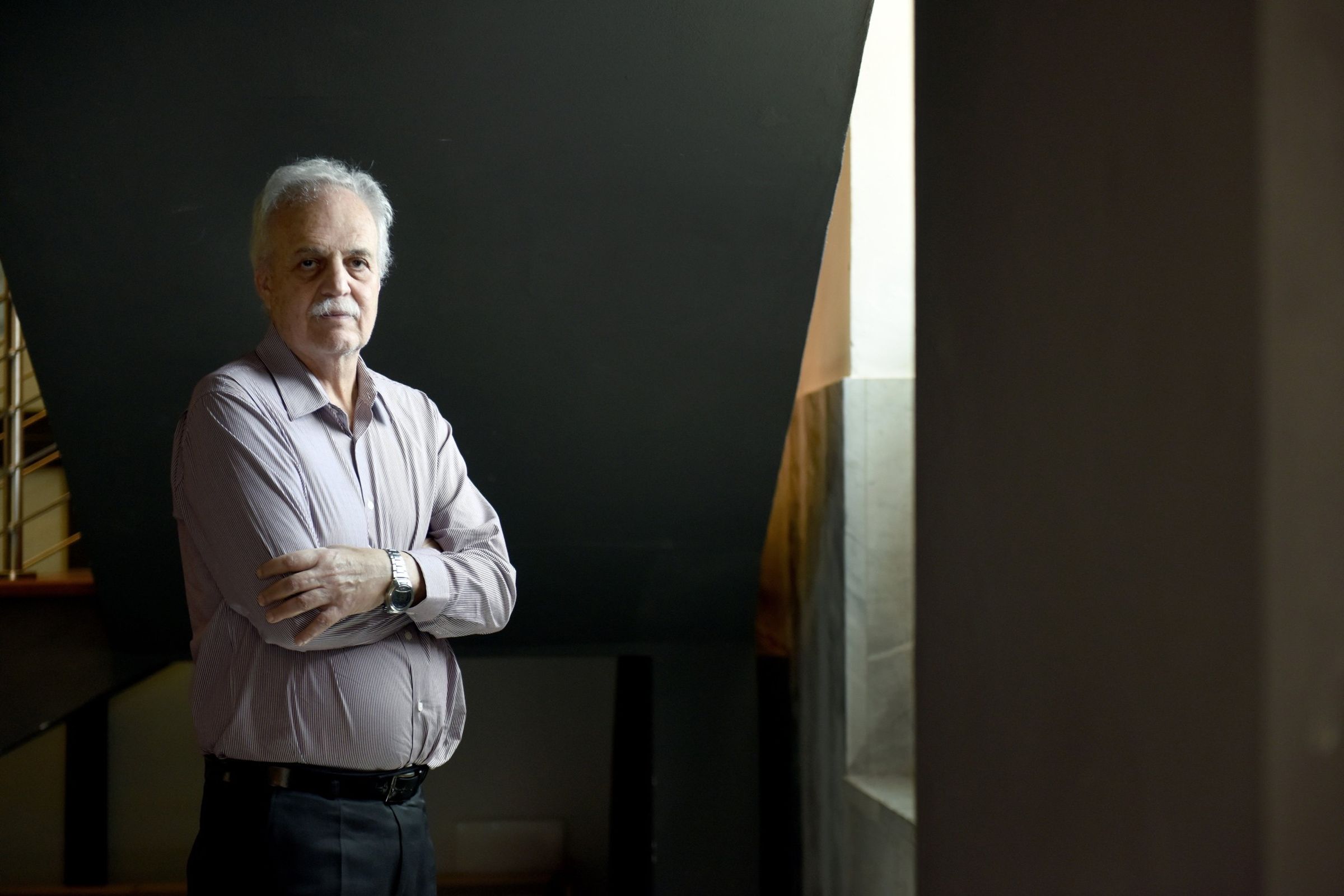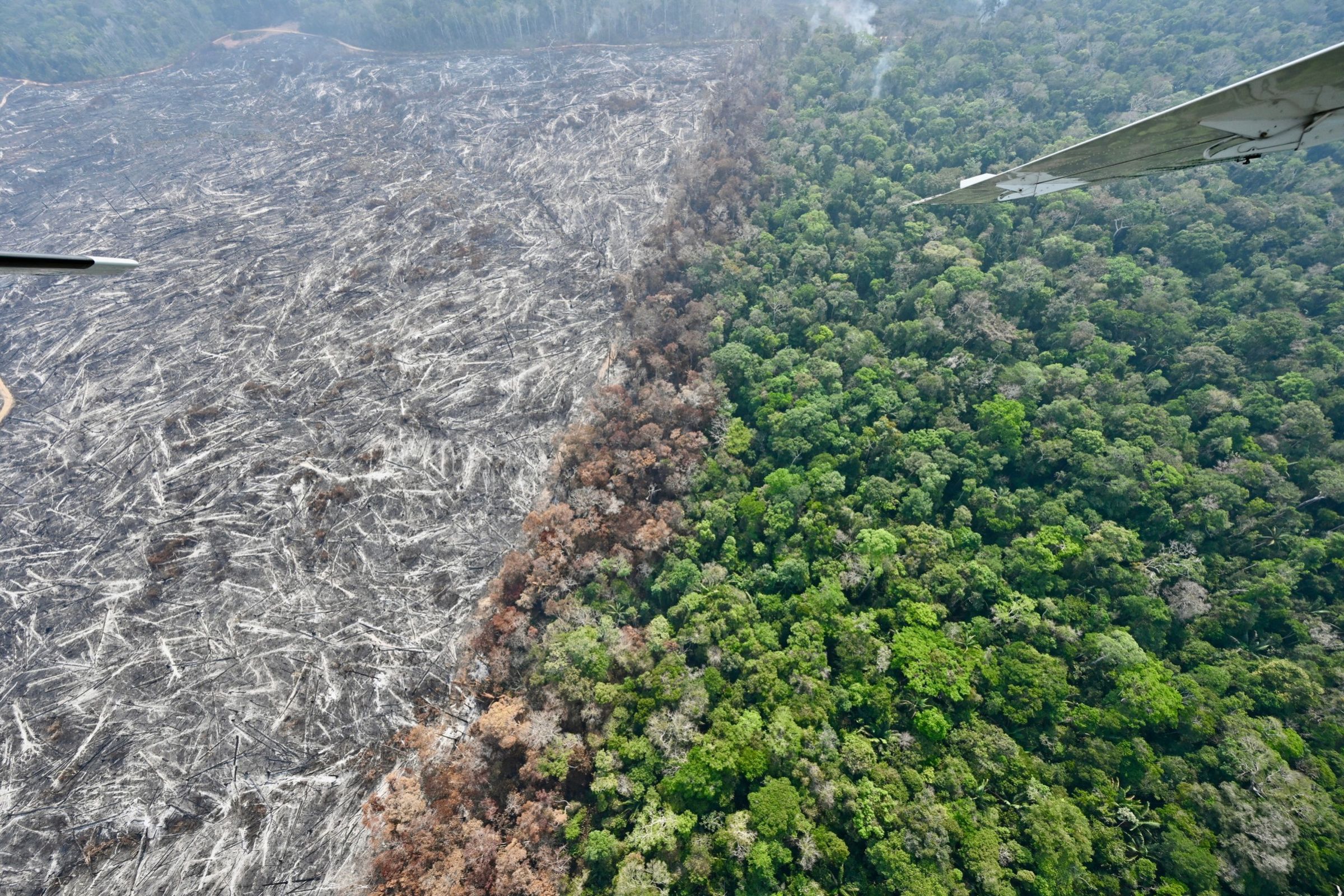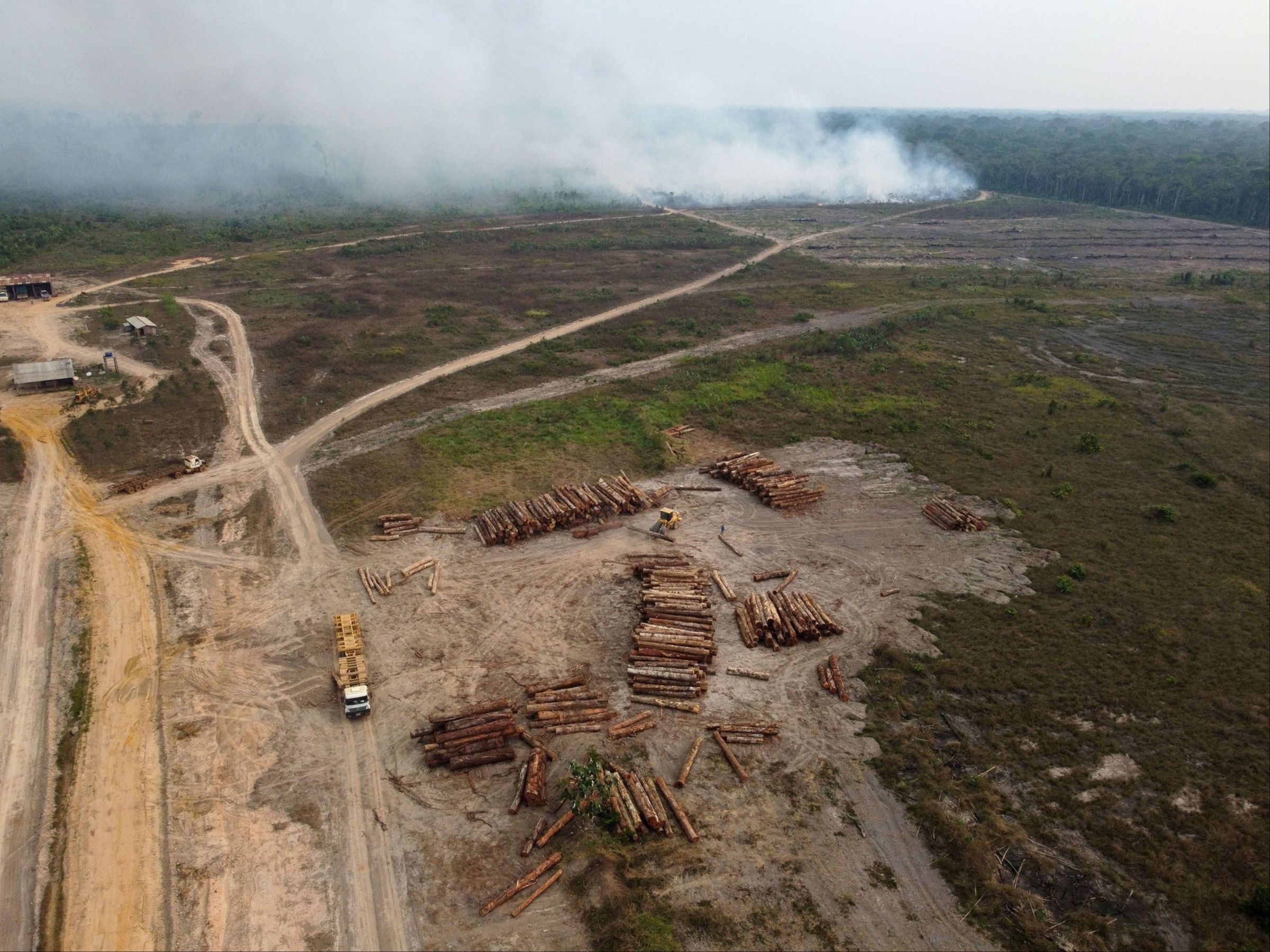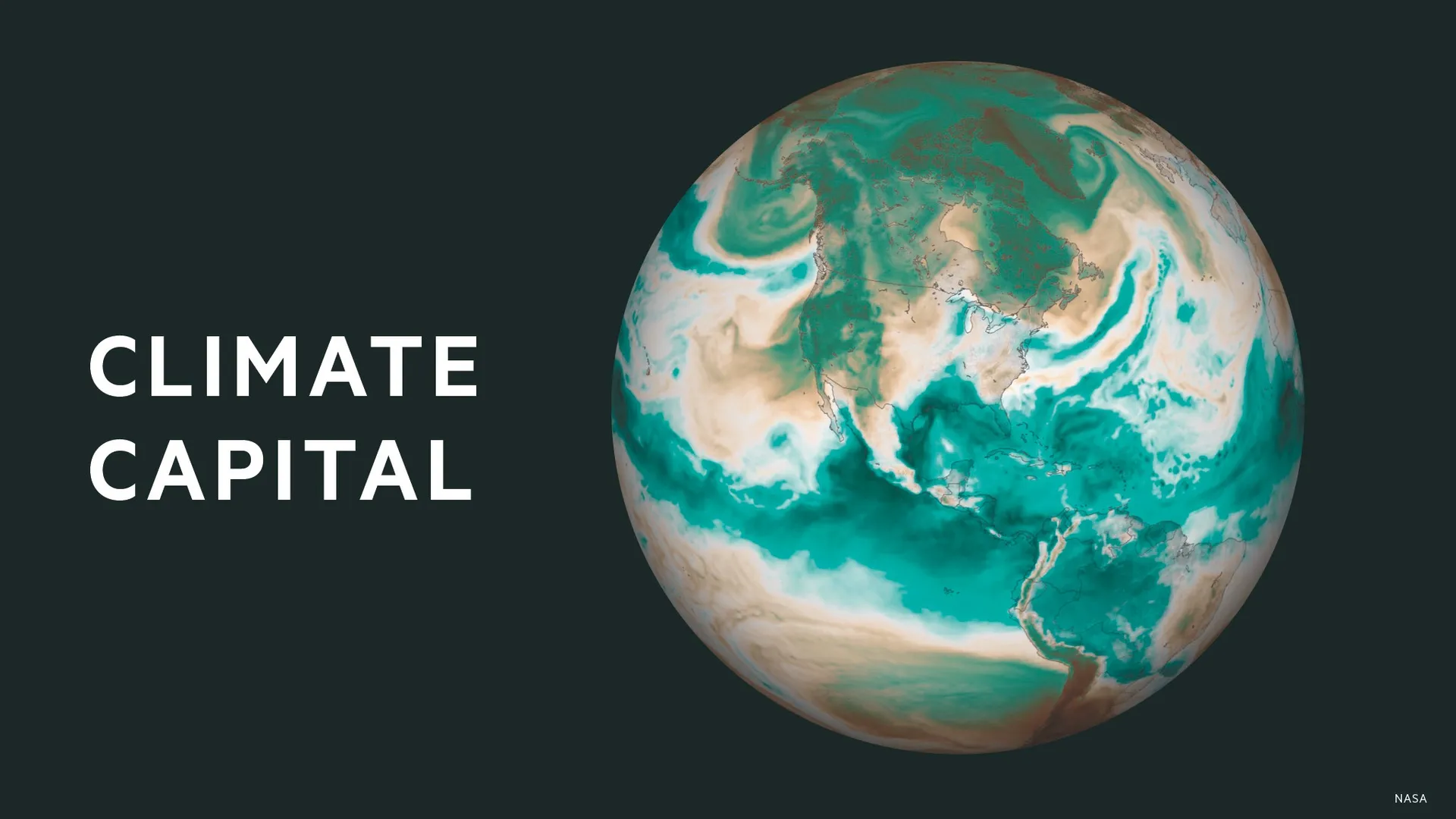尊敬的用户您好,这是来自FT中文网的温馨提示:如您对更多FT中文网的内容感兴趣,请在苹果应用商店或谷歌应用市场搜索“FT中文网”,下载FT中文网的官方应用。


One of Brazil’s most celebrated scientists, Carlos Nobre is best known for his warnings of a “tipping point” in the Amazon: a critical threshold beyond which the world’s largest rainforest enters an irreversible collapse. He is in high demand when we meet shortly before the opening of COP30, the UN climate summit under way this week in the Amazonian port of Belém.
卡洛斯•诺布雷是巴西最负盛名的科学家之一,以其对亚马逊(Amazon)“临界点”的警示而闻名:一旦跨过这一关键门槛,全球最大的雨林将进入不可逆的崩塌。他行程紧凑。我们在第30届联合国(UN)气候大会(COP30)开幕前不久与他见面。大会本周正在亚马逊河畔港口城市贝伦举行。
A global authority on the interactions between tropical rainforests and the climate, Nobre was a lead author of the UN’s Intergovernmental Panel on Climate Change (IPCC) that won a Nobel Peace Prize in 2007 for its reports on global warming. A few years ago, the UK’s Royal Society elected him the first Brazilian member of the scientific academy since Emperor Pedro II in the 19th century.
作为研究热带雨林与气候相互作用的全球权威,诺布雷曾担任联合国政府间气候变化专门委员会(IPCC)的主要作者。该机构因其关于全球变暖的报告于2007年获得诺贝尔和平奖(Nobel Peace Prize)。几年前,英国皇家学会(Royal Society)选举他为自19世纪佩德罗二世皇帝以来首位入选该科学学会的巴西人。
Roughly the size of the contiguous US, the Amazon biome has been called “the lungs of the Earth” because of its massive absorption of carbon dioxide, providing a buffer against climate change. But this vital role is increasingly under threat.
亚马逊生物群系的面积大致相当于美国本土,被称为“地球之肺”,因为它能大量吸收二氧化碳,为应对气候变化提供缓冲。但这一关键作用正日益受到威胁。
According to Nobre’s hypothesis, first formulated in 1990, if 20-25 per cent of the original area is deforested, or global temperatures rise 2-2.5C above pre-industrial levels, the biome will enter a feedback loop where it can no longer regenerate. In a process dubbed savannisation, lush canopies wither as the jungle dries out into parched grasslands with fewer species.
根据诺布雷于1990年首次提出的假说,如果原始面积的20%至25%被砍伐,或全球气温较工业化前水平上升2至2.5摄氏度,这一生物群系将进入一个无法再生的反馈循环。在这一被称为“稀树草原化”的过程中,随着丛林因干旱而变成干裂的草地、物种减少,原本繁茂的树冠将逐渐枯萎。
“If deforestation and global warming continue, the Amazon will reach the point of no return by 2050 at the latest,” he explains.
他解释说:“如果森林砍伐和全球变暖持续下去,亚马逊最迟将在2050年到达不可逆转的临界点。”
In this scenario, 50-70 per cent of the ecosystem could degrade by 2100, Nobre says, releasing a “gigantic amount of CO₂” — more than 250bn tonnes — into the atmosphere. That would make it “impossible” to keep global temperatures within 1.5 degrees, a goal of the 2015 Paris Agreement — the cornerstone of international efforts to combat planetary heating.
诺布雷表示,在这种情况下,到2100年,生态系统可能有50%至70%发生退化,向大气中释放“巨量的二氧化碳”——超过2500亿吨。这将使把全球气温限制在1.5度以内变得“不可行”,而这一目标正是2015年《巴黎协定》(Paris Agreement)的核心目标——这份协定是国际社会抗击全球变暖努力的基石。
“Biodiversity degradation also poses a huge risk of epidemics and pandemics,” Nobre adds. “This is an enormous risk for the entire world.”
“生物多样性的退化也带来巨大的流行病和大流行风险,”诺布雷补充道。“这对整个世界而言都是一个巨大的威胁。”
We are meeting a few minutes’ stroll from Nobre’s home and office in São José dos Campos, about 100km from the centre of the giant metropolis of São Paulo.
我们相约在距离诺布雷位于圣若泽-杜斯坎普斯的家与办公室仅需步行几分钟的地方会面,该市距超大都市圣保罗市中心约100公里。
Once a sanatorium town, over the 20th century São José dos Campos became Latin America’s top aerospace hub. The city is home to planemaker Embraer, as well as Brazil’s National Institute for Space Research (INPE), whose activities include monitoring the Amazon via satellites. It was there that Nobre spent most of his career.
圣若泽杜斯坎普斯曾是疗养胜地,整个20世纪里逐步发展为拉丁美洲首屈一指的航空航天中心。这里是飞机制造商巴西航空工业公司(Embraer)的总部所在地,也坐拥巴西国家空间研究院(INPE),其工作包括通过卫星监测亚马逊。诺布雷的大部分职业生涯都在此度过。
Today a researcher at the University of São Paulo, Nobre no longer conducts research in the Amazon (“I’m not young anymore”, the 74-year-old admits wistfully), but he has lost none of his zeal for saving the rainforest.
如今身在圣保罗大学(University of São Paulo)的一位研究者——诺布雷——已不再在亚马逊开展研究(“我不再年轻了,”这位74岁的老人感叹道),但他拯救雨林的热忱丝毫未减。
Nobre’s love of nature came early. He recalls a childhood trek with his father, a professional footballer with only four years of schooling, in the Atlantic Forest by the shores of São Paulo state. “We got on a boat and he took me around for about three hours,” he says with a smile. “We passed by little rivers and beautiful trees. It was a moment that really grabbed my attention.”
诺布雷对自然的热爱很早就萌发了。他回忆起童年时与父亲在圣保罗州沿海的大西洋森林里徒步的经历——父亲是一名只受过四年教育的职业足球运动员。“我们坐船出发,他带我转了大约三个小时,”他笑着说。“我们经过潺潺小河和葱郁的树木。那一刻深深抓住了我的心。”
His father impressed the importance of preservation upon his children — Nobre has other siblings who are climate scientists too.
他的父亲向孩子们强调了保护的重要性——诺布雷还有其他兄弟姐妹也从事气候科学研究。
We have to go in this direction, otherwise after the 2050s Brazil will no longer be a major food producer
我们必须朝这个方向前进,否则到2050年代之后,巴西将不再是主要的粮食生产国
Talented in mathematics, the young Carlos studied electronic engineering at an institution run by the air force in São José dos Campos. His passion for the Amazon was born in the early 1970s at university, where in the summer holidays a professor took groups of students aboard an air force plane to locations across the region, including indigenous communities.
年轻的卡洛斯擅长数学,曾在圣若泽杜斯坎普斯一所由空军办的院校攻读电子工程。他对亚马逊的热爱始于20世纪70年代初的大学时期:暑假里,一位教授带学生们乘坐空军飞机走访该地区各地,包括原住民社区。
“I became so fascinated by the Amazon,” recounts Nobre. “I fell in love with it, because it was a time when the Amazon had no deforestation. It was beautiful”.
“我对亚马逊着了迷,”诺布雷回忆道。“我爱上了它,因为那时亚马逊还没有发生砍伐。它太美了。”
Brazil was then under a military dictatorship that sought to open up the rainforest with infrastructure, agriculture and settlement. “Deforestation hadn’t started, but it was the policy,” he says. “So of course I started to get very worried. And I put it in my head that I wanted to do research in the Amazon”.
当时巴西处于军政府统治之下,政权试图通过基础设施建设、农业开发和移民定居来开发雨林。“那时森林砍伐还没真正开始,但这就是政策,”他说。“所以我当然开始非常担心。我也下定决心要去亚马逊做研究。”
After graduating, Nobre took a job at a research institute in the jungle city of Manaus, where a supervisor encouraged a switch to science. Following a PhD in meteorology at MIT he began working at INPE from 1983, specialising in mathematical climate modelling, with a brief interlude at the University of Maryland for a postdoc.
毕业后,诺布雷在丛林城市马瑙斯的一家研究机构就职,在一位主管的鼓励下转向科学研究。随后他在麻省理工学院(MIT)完成气象学博士学位,并自1983年起在INPE工作,专攻气候的数学建模;其间曾短暂前往马里兰大学(University of Maryland)做博士后。
With about 18 per cent of the Amazon’s original area deforested, Nobre reckons the point of no return is now “much closer”. There are alarming portents. The Amazon basin registered its most severe drought on record between 2023 and 2024. In the south, the dry season is longer, rainfall is lower and temperatures higher, with certain areas in the biome’s south-east now exhaling more CO₂ than they inhale, explains Nobre. Wildfires, not a natural phenomenon in the rainforest, have also become more frequent and intense.
诺布雷认为,随着亚马逊原始面积约18%已被砍伐,“不可逆转点”现已近在眼前。种种迹象令人担忧:在2023年至2024年间,亚马逊流域经历了有记录以来最严重的干旱。南部地区旱季更长、降雨更少、气温更高;诺布雷解释说,生物群系东南部的某些区域如今排放的二氧化碳已多于吸收。野火——在这片雨林中并非自然现象——也变得更为频繁且更为猛烈。


Another consequence of Amazon vegetation loss is less moisture released from trees to the massive air currents, described as “flying rivers” by meteorologists, that carry rainfall across swaths of South America.
亚马逊植被流失的另一项后果是:树木向巨大气流释放的水分减少。气象学家把这些将降雨输送至南美大片地区的气流称为“空中河流”。
Studies suggest even more distant impacts: “Decreasing rainfall in the Amazon could generate an atmospheric wave that propagates northward and induces droughts in California,” says Nobre. The same could happen in India, he adds, before a caveat: “But these are still scientific studies that need to be demonstrated.”
研究表明,影响可能远及更遥远的地区:“亚马逊降雨的减少可能会在大气中产生一股向北传播的波动,从而在加利福尼亚引发干旱,”诺布雷说。他补充道,印度也可能出现同样的情况,但随即强调:“不过,这些仍是有待验证的科学研究。”
Having appreciated the American scientific spirit from close up, Nobre is all the more perplexed by the country’s environmental turn under President Donald Trump (who not long ago called climate change “the greatest con job ever”).
近距离感受过美国的科学精神之后,诺布雷对该国在唐纳德•特朗普(Donald Trump)总统治下的环境转向更加困惑(特朗普不久前还称气候变化是“史上最大的骗局”)。
To prevent the planet from entering ecocide, we have to stop and explore what’s already being explored
为防止地球走向生态灭绝,我们必须暂停脚步,审视并深入已有的探索
“It’s a mystery to me,” he says. “The country which invested the most in climate science, a country with the largest number of climate scientists and very few scientists who deny [climate change], which contributed the most to the IPCC report — how is it possible for this country to elect a climate denier president? Then, eight years later, re-elect him?”
“这让我百思不解,”他说。“一个在气候科学上投入最多、拥有最多气候科学家、几乎没有否认气候变化的科学家、对政府间气候变化专门委员会(IPCC)报告贡献最大的国家——怎么可能选出一位否认气候变化的总统?然后八年后,又把他重新选上?”
However, he does not despair and, counter-intuitively, believes that Washington’s stance will motivate other countries to take up the slack. “[They] will need to have a very ambitious goal of reducing emissions and greatly increasing the adaptive capacity of billions of people.”
不过,他并未感到绝望,反而出人意料地认为,华盛顿的立场会促使其他国家弥补缺口。“他们将需要设定极其雄心勃勃的减排目标,并大幅提升数十亿人的适应能力。”
Given the political backlash against net zero in rich nations, I am taken aback by his assertion that “science is winning the battle” against climate scepticism. Really?
鉴于富裕国家对“净零”目标的政治反弹,他宣称“科学正在赢得对气候怀疑论的战斗”,这让我颇为错愕。真的是这样吗?
Nobre reckons extreme weather events have proven a wake-up call to people: “For the first time in the decades we’ve been speaking about the risk, populations are now concerned and the number of deniers has diminished greatly.”
诺布雷认为,极端天气事件已经给人们敲响了警钟:“在我们讨论这一风险的几十年里,这是头一次公众真正开始担心,而否认者的数量也大幅减少。”
There is great respect in Brazilian academia towards Nobre, who inspired a generation of scientists. Yet not all agree with the implications of his magnum opus.
在巴西学术界,诺布雷备受尊敬,他曾激励了一代科学家。然而,并非所有人都认同他鸿篇巨制所带来的影响。
One recent paper claimed there was little evidence for a single tipping point across the entire Amazon basin, instead arguing that there are critical thresholds at regional and local levels. Some ecologists criticise the notion of savannisation in the Amazon, positing that it is harmful for efforts to preserve Brazil’s Cerrado biome, the world’s most biodiverse savannah.
一篇最新论文声称,几乎没有证据支持整个亚马逊流域存在单一临界拐点;相反,该论文认为,在区域和地方层面存在各自的关键阈值。一些生态学家批评“稀树草原化”这种对亚马逊的设想,认为这不利于保护巴西的塞拉多(Cerrado)生物群系——这是世界上生物多样性最丰富的稀树草原。
Studies indicate that a large part of the Amazon would become a highly degraded savannah
研究表明,亚马逊的大部分地区将会退化成高度退化的稀树草原
Nobre pushes back against the criticisms. “Studies indicate that a large part of the Amazon would become a highly degraded savannah,” he responds.
诺布雷反驳了这些批评。他回应说:“研究表明,亚马逊的大部分将会变成高度退化的稀树草原。”
However, there has been good news lately. Brazil’s President Luiz Inácio Lula da Silva has overseen a sharp drop in Amazon deforestation to its lowest level in 11 years. While praising the leftwinger’s environmental commitment and his proposal for a $125bn international fund for the preservation of tropical rainforests, Nobre says Brasília’s aim to eliminate illegal deforestation by 2030 should instead be a total ban.
不过,最近也有好消息。巴西总统路易斯•伊纳西奥•卢拉•达席尔瓦(Luiz Inácio Lula da Silva)推动亚马逊砍伐率大幅下降,降至11年来最低。诺布雷在称赞这位左翼领导人的环保承诺以及其提出设立1250亿美元国际基金以保护热带雨林的同时表示,巴西利亚到2030年消除非法毁林的目标应改为全面禁令。
This sounds unrealistic. Brazilian landowners are already legally obliged to preserve part of their property in its natural state (80 per cent in the Amazon forest, 20-35 per cent in the Cerrado). Tightening the rules would likely generate resistance from the powerful agribusiness lobby.
这听起来不太现实。巴西的土地所有者已经被法律要求将其部分土地保持自然状态(在亚马逊森林为80%,在塞拉多为20%至35%)。进一步收紧规定很可能会引发强大的农业综合企业游说团体的抵制。
“We have to go in this direction, otherwise after the 2050s Brazil will no longer be a major food producer,” Nobre insists. Cattle ranching is the biggest driver of Amazon deforestation, which led the climatologist to go vegetarian. Other causes include illegal logging and mining.
“我们必须沿着这条道路前进,否则到2050年代之后,巴西将不再是主要的粮食生产国,”诺布雷坚持表示。养牛业是亚马逊森林砍伐的最大推手,这也促使这位气候学家转而素食。其他原因还包括非法伐木和采矿。


Lula has also promoted oil exploration, including by the Amazon river estuary, sparking accusations of climate hypocrisy. Protesters including indigenous activists clashed with security at the COP30 venue this week, denouncing crude drilling in the region.
卢拉还推动石油勘探,包括在亚马逊河河口一带的项目,因而被指责在气候问题上虚伪。本周,包括原住民活动人士在内的抗议者在第30届联合国气候大会会场与安保发生冲突,谴责该地区的原油开采。
Asked about the government’s petroleum policy, Nobre sticks to generalities: “There’s no justification for new oil or coal mining anywhere in the world. Because to prevent the planet from entering ecocide, we have to stop and explore what’s already being explored.”
被问及政府的石油政策时,诺布雷只给出笼统的表述:“世界上任何地方都没有开采新的石油或煤炭的理由。为了防止地球走向生态灭绝,我们必须停止并仅在既有项目范围内开展探索。”
Nowadays he likes to combine science with action. After years of sounding doomsday alarms, Nobre had a change of approach in 2019. “I thought, I only talk about risks and never work on solutions. It’s a psychological problem of mine.”
如今,他喜欢把科学与行动结合起来。经过多年敲响末日警钟,诺布雷在2019年改变了做法。“我想,我只谈风险,从不研究解决方案。这是我的心理问题。”
This led to Amazônia 4.0, a project backing sustainable forest-based businesses that conserve or restore trees. “It’s to demonstrate the potential of value-adding and industrialisation of biodiversity,” says Nobre. Initiatives include a factory for indigenous people to produce chocolate from cupuaçu, an Amazonian fruit similar to cacao.
这促成了“Amazônia 4.0”项目的诞生,该项目支持以森林为基础、能够保护或恢复森林的可持续业务。诺布雷表示:“其目的是展示对生物多样性进行价值提升和产业化的潜力。”相关举措包括为原住民建设一家工厂,用亚马逊地区与可可相似的水果——库普阿苏来生产巧克力。
The scientist’s idealism remains undimmed. “The greatest pleasure for me is that the new generations are concerned and will have to assume leadership. In a decade from now, [Swedish climate activist] Greta Thunberg will begin to have great leadership,” he says. “Science showed the risk to my generation [but we] never stopped increasing emissions,” he adds.
这位科学家的理想主义依然未减。他说:“让我最欣慰的是,新一代很有担当,并且将不得不承担领导角色。再过十年,[瑞典气候运动人士]格蕾塔•通贝里(Greta Thunberg)将开始展现强大的领导力。”他补充道:“科学已经向我的一代人揭示了风险,但我们从未停止增加排放。”
And his personal legacy? “I will be the happiest person in the world if we save the Amazon [and then] all the other biomes in Brazil”. For all his foreboding forecasts, the hopefulness is a tonic to climate defeatism.
至于他个人的遗产呢?“如果我们拯救了亚马逊,然后拯救巴西所有其他生物群系,我将是世界上最幸福的人。”尽管他的预测充满不祥,但这种希望对抗气候失败主义不啻为一剂强心剂。
Michael Pooler is the FT’s Brazil correspondent, based in São Paulo
迈克尔•普勒(Michael Pooler)是英国《金融时报》驻巴西记者,常驻圣保罗
Climate Capital

Where climate change meets business, markets and politics. Explore the FT’s coverage here.
Are you curious about the FT’s environmental sustainability commitments? Find out more about our science-based targets here